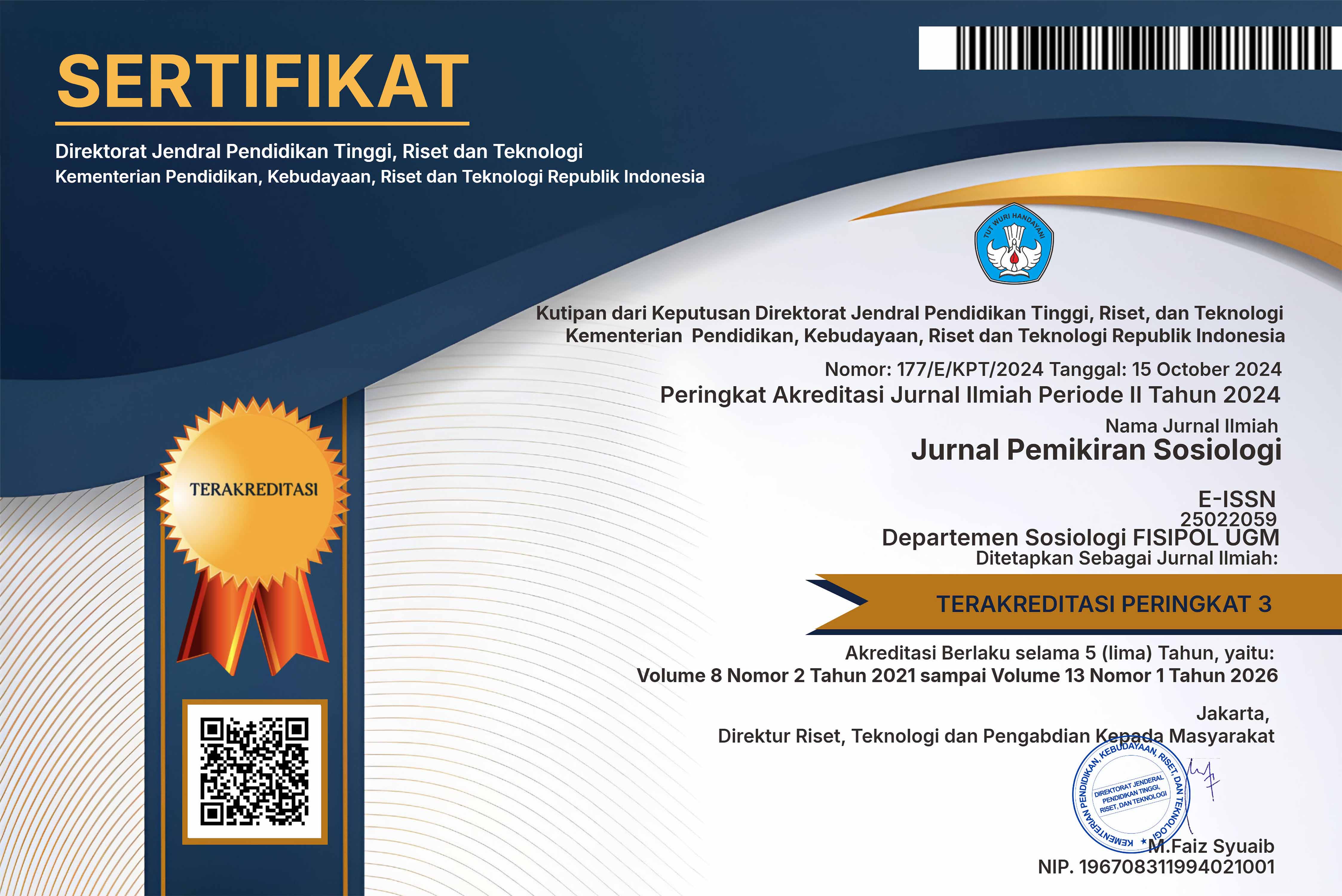Hasrat Konsumsi Virtual dalam Permainan Daring Mobile Legends: Perspektif Deleuze dan Guattari
Rino Andreas(1*), Dian Arymami(2)
(1) Kajian Budaya dan Media, Sekolah Pascasarjana Universitas Gadjah Mada, Indonesia.
(2) Kajian Budaya dan Media, Sekolah Pascasarjana Universitas Gadjah Mada, Indonesia.
(*) Corresponding Author
Abstract
Konsumsi virtual, lekat dengan kehidupan masyarakat yang dimediasi oleh teknologi komunikasi dan informasi digital. Salah satunya dapat dilihat dalam ekosistem permainan daring (game online). Tulisan ini bertujuan untuk mengeksplorasi kompleksitas hasrat konsumsi virtual para pemain Mobile Legend: Bang Bang (MLBB) dari perspektif Deleuze dan Guattari serta memaparkan siasat para pemain MLBB yang berupaya keluar dari nilai-norma yang dimapankan oleh kapitalisme digital abad-21. Penelitian kualitatif ini menggunakan metode etnografi virtual yang menempatkan peneliti dalam aktivitas observasi dan partisipasi aktif di ruang virtual. Berdasarkan observasi dan FGI (focus group interview) peneliti melihat bahwa hasrat konsumsi pemain MLBB berada di tataran mikro dan makro. Mesin hasrat dari perspektif Deleuze dan Guattari menghubungkan individu sekaligus sistem sosial sebagai (machinic assemblage). Hasilnya, hasrat konsumsi pemain MLBB tidak hanya di jelaskan dari relasi pemain dan objek virtual itu sendiri melainkan, juga mencakup jaringan kepentingan kapital yang lebih luas meliputi, pihak penyedia jaringan komunikasi, produsen perangkat mobile, perusahaan energi listrik, maupun perusahan finansial teknologi. Hasrat konsumsi sebagai aliran konstruktif, menghadirkan dinamika pemain yang melakukan deteritorialisasi. Proses ini meninggalkan garis batas (line of flight) nilai-nilai yang dibangun oleh wilayah kapitalisme digital dengan cara melakukan praktik cheating. Pada gilirannya praktik cheating sebagai materialisasi hasrat “chaos” itu ditangkap kembali melalui proses reteritorialisasi oleh pengembang ke dalam sistem pengawasan kecerdasan buatan (Artificial Intelligence) yakni dengan memberikan hukuman. Memastikan para pemain melakukan konsumsi virtual sesuai dengan tatanan yang berlaku. Maka, hasrat “chaos” telah dikodekan kembali oleh wilayah industri permainan daring, sehingga mendorong pemain mengeluarkan uangnya untuk membeli barang virtual secara terus menerus.
Keywords
Full Text:
PDFReferences
Alfarizi, M. K. 2020. Pemain Mobile Legends Indonesia Terbanyak di Dunia. Tempo.co diakses 15 November 2020 melalui https://tekno.tempo.co/read/1166277/pemain-mobile-legends-indonesia-terbanyak-di-dunia/full&view=ok
Arias, Andrea Vanina. 2008. “Life, Liberty, and the Pursuit of Swords and Armors: Regulating the Theft of Virtual Goods.” Emory Law Journal 57 (5): 1301-1346
Chapple, C. 2020. Mobile Legends Revenue Passes $500 Million as Southeast Asia Powers Explosive Growth. Sensor Tower diakses 30 November 2021 melalui https://sensortower.com/blog/mobile-legends-revenue-500-million
Deleuze, G., & Guattari, F. 1972. Anti-Oedipus: Capitalism and Schizophrenia. Diterjemahkan oleh Robert Hurley, Mark Seem, and Helen R. Lane. Minneapolis: University of Minnesota Press
Deleuze, G., & Guattari, F. (2000). A Thousand Plateaus: Capitalism and Schizophrenia. Diterjemahkan oleh Brian Massumi. Minneapolis: University of Minnesota Press.
Dyer-Witheford, N., & Matviyenko, S. 2019. Cyberwar and revolution: Digital subterfuge in global capitalism. of Minnesota Press.
Elliott, L., Golub, A., Ream, G., & Dunlap, E. 2012. Video game genre as a predictor of problem use. Cyberpsychology, Behavior, and Social Networking, 15(3), 155-161.
Fairfield, J. 2005. Virtual property. Boston University Law Review, 85, 1047–1102.
Guo, Y., & Barnes, S. (2007). Why people buy virtual items in virtual worlds with real money. ACM SIGMIS Database, 38(4), 69–76
Hamari, J., Keronen, L., & Alha, K. (2015). Why do people play games? A review of studies on adoption and use. In 2015 48th Hawaii International Conference on System Sciences (pp. 3559-3568). IEEE.
Hartono, A. 2007. Skizoanalisis Deleuze+Guattari: Sebuah Pengantar Genealogi Hasrat. Yogyakarta: Jalasutra.
Ho, C. H., & Wu, T. Y. 2012. Factors affecting intent to purchase virtual goods in online games. International Journal of Electronic Business Management, 10(3).
Ida, R. 2018. Etnografi Virtual Sebagai Teknik Pengumpulan Data dan Metode Penelitian. The Journal of Society and Media, 2(2), 130-145.
Kozinets, R., Patterson, A., & Ashman, R. 2017. Networks of desire: How technology increases our passion to consume. Journal of Consumer Research, 43(5), 659-682.
Lehdonvirta, V. 2009. Virtual consumption. Turku School of Economics, No. A-11.
Li, Zhaohui. 2012. Motivation of Virtual Goods Transactions Based on the Theory of Gaming Motivations. Journal of Theoretical and Applied Information Technology. Vol. 43, No. 2. ISSN: 1992-864.
Mennecke, B., Terando, W. D., Janvrin, D. J., & Dilla, W. N. 2007. It’s just a game, or is it? Real money, real income, and real taxes in virtual worlds. Communications of AIS, 19, 134–141.
Moar, James. 2020. Cloud Gaming: an Emerging Trend Within the Video Games Market. Dipettik 10 desember 2020 melaui https://www.juniperresearch.com/new-trending/analystxpress/september-2020-(1)/cloud-gaming-an-emerging-trend-within-the-video-ga
Nur, W., & Kayano, S. 2020. Kuasa Algoritmik dalam Masyarakat Digital Interpretasi Pandangan Foucault Atas Teknologi. TEKNOSAINS: MEDIA INFORMASI SAINS DAN TEKNOLOGI, 14(1).
Priatama, A. 2018. Uang dan Peluang: Konsumsi Barang Virtual dalam Game RF Online Indonesia. Jurnal Pemikiran Sosiologi, 5(2), 1-26.
Rodríguez, B. 2017. Purchasing behaviour on aesthetic items in online video games with real currency: The case of Counter Strike: Global Offensive.
.
Wang, W. T., & Chang, W. H. 2014. A study of virtual product consumption from the expectancy disconfirmation and symbolic consumption perspectives. Information Systems Frontiers, 16(5), 887-908.
Wijaya, A. N., & Alamanda, D. T. 2016. Kajian Teori Nilai Konsumsi Terhadap Pembelian Barang Virtual Pada Game Online F2p Moba. eProceedings of Management, 3(1).
Article Metrics
Refbacks
- There are currently no refbacks.
Copyright (c) 2022 Jurnal Pemikiran Sosiologi

This work is licensed under a Creative Commons Attribution-ShareAlike 4.0 International License.
Jurnal Pemikiran Sosiologi Indexed by:
ISSN 2252-570X (Print), ISSN 2502-2059 (online).

















